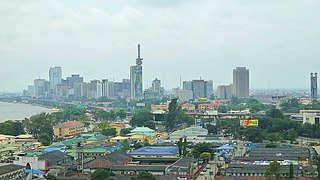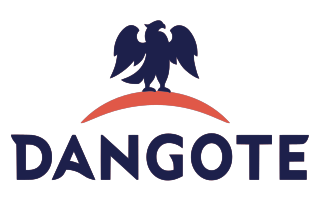
The economy of Nigeria is a middle-income, mixed economy and emerging market, with expanding manufacturing, financial, service, communications, technology and entertainment sectors. It is ranked as the 27th-largest economy in the world in terms of nominal GDP, and the 22nd-largest in terms of purchasing power parity. Nigeria has the largest economy in Africa; its re-emergent manufacturing sector became the largest on the continent in 2013, and it produces a large proportion of goods and services for the West African subcontinent. In addition, the debt-to-GDP ratio is 16.075 percent as of 2019.

A pickup truck or pickup is a light-duty truck having an enclosed cab and an open cargo area with low sides and tailgate. In Australia and New Zealand, both pickups and coupé utilities are called utes, short for utility vehicle. In South Africa, people of all language groups use the term bakkie, a diminutive of bak, Afrikaans for "bowl" or "container".
A tariff is a tax on imports or exports between sovereign states. It is a form of regulation of foreign trade and a policy that taxes foreign products to encourage or safeguard domestic industry. Traditionally, states have used them as a source of income. Now, they are among the most widely used instruments of protectionism, along with import and export quotas.

Import substitution industrialization (ISI) is a trade and economic policy which advocates replacing foreign imports with domestic production. ISI is based on the premise that a country should attempt to reduce its foreign dependency through the local production of industrialized products. The term primarily refers to 20th-century development economics policies, although it has been advocated since the 18th century by economists such as Friedrich List and Alexander Hamilton.
A grey or gray market refers to the trade of a commodity through distribution channels that are not authorized by the original manufacturer or trade mark proprietor. Grey market products are products traded outside authorized manufacturer channel.
Dumping, in economics, is a kind of injuring pricing, especially in the context of international trade. It occurs when manufacturers export a product to another country at a price below the normal price with an injuring effect. The objective of dumping is to increase market share in a foreign market by driving out competition and thereby create a monopoly situation where the exporter will be able to unilaterally dictate price and quality of the product.

An export in international trade is a good or service produced in one country that is bought by someone in another country. The seller of such goods and services is an exporter; the foreign buyer is an importer.
Grey import vehicles are new or used motor vehicles and motorcycles legally imported from another country through channels other than the maker's official distribution system. The synonymous term parallel import is sometimes substituted.
The economy of Africa consists of the trade, industry, agriculture, and human resources of the continent. As of 2019, approximately 1.3 billion people were living in 54 different countries in Africa. Africa is a resource-rich continent. Recent growth has been due to growth in sales in commodities, services, and manufacturing. West Africa, East Africa, Central Africa and Southern Africa in particular, are expected to reach a combined GDP of $29 trillion by 2050.
A knock-down kit is a kit containing the parts needed to assemble a product. The parts are typically manufactured in one country or region, then exported to another country or region for final assembly. Variant names include knockdown kit, knocked-down kit, or simply knockdown, and the abbreviated KD.

Iran’s automotive industry is the third most active industry of the country, after its oil and gas industry, accounting for 10% of Iran's GDP and 4% of the workforce.
A parallel import is a non-counterfeit product imported from another country without the permission of the intellectual property owner. Parallel imports are often referred to as grey product and are implicated in issues of international trade, and intellectual property.
Industry in Ghana accounts for about 25.3% of total GDP. However, Ghana's industrial production is rising at a 7.8% rate, giving it the 38th fastest growing industrial production in the world due to government industrialization policies.

The Dangote Group is a Nigerian multinational industrial conglomerate, founded by Aliko Dangote. It is the largest conglomerate in West Africa and one of the largest on the African continent. The group employs more than 30,000 people, generating revenue in excess of US$4.1 billion in 2017.

Automotive production is a significant industry in Russia, directly employing around 600,000 people or 1% of the country's total workforce. Russia produced 1,767,674 vehicles in 2018, ranking 13th among car-producing nations in 2018, and accounting for 1.8% of the worldwide production. The main local brands are light vehicle producers AvtoVAZ and GAZ, while KamAZ is the leading heavy vehicle producer. Eleven foreign carmakers have production operations or are constructing their plants in Russia.
The automotive industry in Malaysia consists of 27 vehicle producers and over 640 component manufacturers. The Malaysian automotive industry is the third largest in Southeast Asia, and the 25th largest in the world, with an annual production output of over 500,000 vehicles. The automotive industry contributes 4% or RM 40 billion to Malaysia's GDP, and employs a workforce of over 700,000 throughout a nationwide ecosystem.
As of 2017, the automotive industry in Thailand was the largest in Southeast Asia and the 12th largest in the world. The Thai industry has an annual output of near two million vehicles, more than countries such as Belgium, the United Kingdom, Italy, Czech Republic and Turkey.
Automotive industry in Nigeria dates back to the 1950s and consists of the production of passenger cars and commercial trucks. Early production was led by the assembly line of Bedford TJ trucks made by United Africa Company's subsidiary, Federated Motors Industries and SCOA's production of Peugeot 404 pickup trucks. Significant development began in the 1970s, during a period of oil boom, the Federal Government of Nigeria signed joint venture partnerships with foreign car manufacturers to assemble vehicles and provide technical assistance towards vertical integration within the local industry. These foreign brands went on to dominate the industry from the middle of the 1970s to the end of the 1980s. The passenger vehicles brands were Peugeot Nigeria Ltd and Volkswagen. The commercial vehicles manufacturers, Leyland, Anambra Motor Manufacturing, and Steyr competed with Bedford truck for dominance. The companies simply assembled kits and completely knocked down parts imported from abroad. In the marketplace, demand was largely dictated by the government's budgetary concerns. Towards the end of the 1980s the industry was negatively affected by a downturn in the economy, government's inconsistency and the higher cost of locally manufactured cars compared to imported counterparts. By 2000, used foreign cars dominated car sales in the country, and the rise of these affordable used cars negatively impacted the development of backward integration in the industry. Recently, a local brand, Innoson has opened an assembly plant in the country.

The automotive industry in Egypt has been developing for 50 years. It can sell more than 200,000 of all types of vehicles annually and now becomes the second biggest market in Africa and the 42nd largest in the world, with an annual production output of over 70,000 vehicles. After experiencing many failures and success, the Egyptian Automotive industry is more focussing on assembly operations, rather than manufacturing.
Chinese used vehicle exporting is a grey market international trade involving the export of used cars and other vehicles from China to other markets around the world. With 300 million cars in China, Chinese vehicles are now entering the used vehicle market overseas to boost demand for the domestic market.






